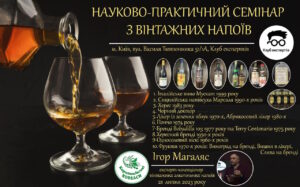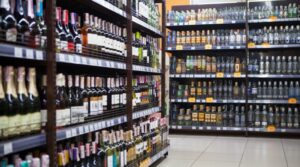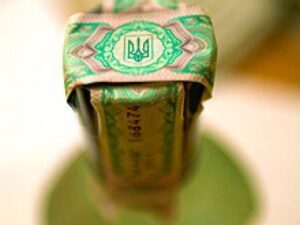
In 2023, the largest alcohol producers increased their income tax payments by 1.7 times compared to 2022, and their income tax efficiency increased from 1.4% in 2022 to 2.0% in 2023, said Danylo Hetmantsev, chairman of the Parliamentary Committee on Finance, Taxation and Customs Policy.
“Measures to de-shadow the alcoholic beverage market, despite the fierce resistance of black market areas (the so-called ‘business defenders’ and ‘sofa experts’), are yielding positive results in the form of budget revenues,” he wrote on Telegram.
The committee chairman named National Vodka Company LLC (Bayadera Group), LVN Limited LLC (TM Nemiroff), Lviv Distillery, and Shustov-Spirt ALC as the leaders in terms of tax efficiency.
According to him, Global Spirit Group has significantly improved its VAT tax efficiency from 3.5% in 2022 to 6.1% in 2023 and 9.4% in 2 months of 2024.
According to Mr. Hetmantsev, the largest alcohol producers have improved their performance not only in terms of income tax, but also in terms of VAT. For two months of this year, VAT payable has already been declared by 28.1% more than in the same period last year.
At the same time, the VAT tax efficiency increased to 6.2% in two months of 2024 from 4.9% in two months of 2023. At the same time, this figure increased by 5.2% compared to 2023.

On Friday, July 31, the conference hall of the Kyiv-based think tank Experts Club hosted the fourth scientific and practical seminar-tasting of vintage drinks for people aged 20 to 80. The event was attended by Ukrainian and international wine experts, retailers and media representatives. Ricardo Nuñez, one of the world’s leading winemakers and an investor in the Ukrainian wine industry, was the guest of honor.

Igor Magalyas, a leading expert collector of vintage alcoholic beverages, introduced the participants to his collection, which includes the most popular Ukrainian and European brands of wines and brandies, including:
1. Italian wine Muscat, produced in 1999, which has a unique bouquet, characterized by luxury and depth.
2. Black Doctor 2005 – a wine with a wonderful multi-component aroma, which harmoniously combines the tones of dark grapes.
3. Massandra sherry made in 1983 is a unique wine from the Crimea, famous for its palette of aromas and flavors.
4. Sicilian semi-dry Marsala of the 1990s – this drink gives off a feeling of rich flavor, complemented by notes of cherry, fruit and vanilla. Marsala is considered one of the most famous Italian wines and is a symbol of Sicilian winemaking.
5. Green apple liqueur from the 1970s – this drink is attractive for its fresh and fruity aroma, with a balance of acid and sweetness. Its unique flavor evokes memories of summer, green apples and outdoor picnics.
6. Apricot liqueur of the 1980s is a sweet, but not over-colored drink that explodes with natural apricot flavors.
7. Poncho 1974 is a citrus alcoholic beverage with a unique flavor bouquet that combines the acidity of lemon, orange and grapefruit with light notes of spices. Made according to a traditional recipe, Poncho is a classic of cocktail culture.
8. Bobadilla 103 Sherry Brandy 1977 – with an unsurpassed bouquet of vanilla, caramel and nuts, this brandy is a model of sherry style. It has a balance between sweet and dry, with a rich and intense flavor.
9. Terry Centenario Sherry Brandy 1975 is a perfect representative of Spanish sherry, known for its deep aroma, with notes of nuts, fruits and spices. Its rich, delicious flavor and long aftertaste are the unique features of this exceptional drink.

10. Sherry brandy from the 1950s is a true relic of the past, with a rich and intense flavor that includes notes of caramel, nuts and dried fruit. This old sherry brandy is a reminder of the long and glorious history of winemaking in Spain.
The most intriguing part of the tasting was the rare dessert drinks, which are a real “living museum” of the alcohol industry of the 1970s. These are four special drinks: grapes, cherries, plums and raisins infused in different types of brandy and liqueurs. Among them, the Muscat raisin grappa was especially appreciated by experts, as it is distinguished by its unique bouquet.
High-quality gastronomic pairings for the drinks presented during the tasting program were provided by one of the best Ukrainian meat producers, Karapyshivski Kovbasy, a trademark of the company.
Igor Magalyas noted that all the presented drinks are in an affordable price segment, and their cost does not exceed the cost of modern vintage alcohol in Ukrainian supermarkets.
“These drinks were purchased by collectors in Europe at auctions or sales of private collections. They have a number of flavor and quality advantages over modern drinks,” he said.
Maxim Urakin, the event’s organizer, emphasized the importance of systemic support for Ukrainian winemaking.
“Long-standing Ukrainian-made beverages have traditionally been at the top of our experts’ preferences. However, without new systemic efforts by the government to support the industry, the situation will deteriorate. That’s why the Club of Experts analyzes the situation and provides its proposals in this regard,” emphasized Maxim Urakin.
ALCOHOL, CLUB_OF_EXPERTS, EUROPEAN_WINE, KOROPYSHIVSKI_SAUSAGES, MAGALIES, RICARDO_NUNEZ, SEMINAR, TASTING, UKRAINIAN_WINE, URAKIN, WINE, WINE_INDUSTRY, WINEMAKING

Moutai (“Maotai,” a subspecies of China’s traditional baijiu spirits) has topped the global alcoholic beverage rankings for the eighth consecutive time, according to an annual study by Brand Finance.
The brand, owned by Kweichow Moutai Co. Ltd. is valued at $49.7 billion, with its value increasing 16% over the year.
Two more Chinese brands – Wuliangye ($30.3 bln, +5.4%) and Xinghuacun Fen Wine ($8.4 bln, +68%) – ranked second and third.
The fastest growing brands were tequila producers – Mexican 1800 ($424m, +111.5%) and US Casamigos ($934m, +108.5%). Tequila has been outpacing all other spirits in terms of market growth for several years now, notes Henry Farr, deputy director of Brand Finace.
The first place among beer brands in the world took Heineken: its value has increased by almost 10% – up to $7.6 billion. Corona Extra, which headed the list last year, fell to the second position, due to a less significant increase – by 6% to $7.4 billion. The third place was retained by Budweiser – the brand has added in value of almost 20%, reaching a mark of $6.7 billion.
The fastest growth in the beer and beer drinks segment was demonstrated by Chinese brands Zhujiang ($680 mln, +44%) and Tsingtao ($2.1 bln, +39%). Unlike other companies, Zhujiang Brewery did not increase the cost of its products, offering customers an optimal price-quality ratio. This increased demand for its products from young and price-sensitive consumers. Tsingtao’s success is due to the revision of its business model: in 2022, the brand owner opened more than 250 beer houses and presented a new customer-oriented strategy, according to Brand Finance.
In the category of “wine and champagne” the most expensive brand for the third time in a row became Moet & Chandon. Its value is estimated at $1.3 billion, which is 10% less than last year.
Its closest competitor – Chinese Changyu – on the contrary, managed to show a positive dynamics of 33% (up to $1.2 billion) and rise by two positions at once over the year. Despite the fact that this brand is little known in Western countries, Brand Finance experts do not rule out that in the future it may lead the rating due to the growth of the already voluminous wine drinks market in China.
The third line in the wine and champagne segment with an indicator of $1 billion was taken by the American brand Chandon (+8%).
The fastest growing brand in this category was Penfolds ($659 mln, +48%). The Australian company Treasury Wine Estates, which owns the brand, is currently making efforts to increase its global awareness and market share. Thus, the 2022 collection for the first time includes not only Australian, but also French and Californian wines.

Ministry of Economy and Trade has developed a draft resolution of the Cabinet of Ministers “On Amendments to the Annex to the Resolution of the Cabinet of Ministers of Ukraine No. 957 of October 30, 2008”, which provides for an increase in the minimum wholesale and retail prices for certain types of alcoholic beverages.
According to information on the website of the Ministry of Economy, the current size of the minimum wholesale and retail prices for alcoholic beverages was established by the relevant Cabinet of Ministers’ resolution No. 748 in September 2018, except for retail prices for sparkling wines and carbonated wine drinks.
“The changes that have occurred in the socio-economic and tax spheres, in particular, the growth of the expenditure component of prices (raw materials, components, energy, labor costs, etc.), as well as the change of excise tax rates for alcoholic beverages on March 1, 2022, have led to the fact that the size of minimum prices does not correspond to the real costs of economic entities for the production and sale of alcoholic beverages and requires adjustment,” – noted in the explanatory note to the document.
The new resolution proposes to increase the size of minimum wholesale and retail prices for certain types of alcoholic beverages depending on the code of products from the UKTVED, including retail prices for vodka and liquor products to increase by 13%, whiskey, rum and gin – by 25%, cognac (brandy) – by 11-12%.
The rates for wine products, in particular, ordinary (non-sparkling) wines will be increased by 62%; for cider, perry, wines, vermouth and other fermented beverages (including mixtures of fermented beverages and mixtures based on fermented beverages), the actual strength of which is higher than 1.2% of volumetric units of ethyl alcohol, but not higher than 22% of volumetric units of ethyl alcohol – by 61-71%; for sparkling wines and carbonated wine drinks – by 28%.
Notes to the Decree will be supplemented with a new paragraph, according to which the minimum retail price for wine products (except for cider and perry (without added alcohol), fermented drinks obtained exclusively as a result of natural fermentation of fruit, berry and fruit-berry juices, with alcohol content not exceeding 8.5% of volume units (without added alcohol) in Tetra-Pak and Bag in box packaging will be determined as a derivative of the approved minimum price for the corresponding products in glass containers with a capacity of 0.7 liters, in other containers with a capacity of 0.7 liters.
All changes in the descriptions of goods and their grouping by codes according to UKTVED will be harmonized with the Tax Code of Ukraine.

The Cabinet of Ministers of Ukraine at a meeting on Friday roughly doubled the fee for excise tax stamps for alcoholic beverages, tobacco products and liquids used in electronic cigarettes to cover costs associated with their production, storage and sale, the Finance Ministry said.
According to its release, the stamp for alcoholic beverages went up from 16 kopecks to 35 kopecks, for tobacco, electronically heated tobacco products (TIEN) and liquids used in e-cigarettes – from 9 kopecks to about 16 kopecks.
The cost of the excise tax stamp has not changed since 2014, the Ministry of Finance pointed out.
As reported, the Verkhovna Rada in January 2023 adopted in the first reading of the Eurointegration bills № 8286 and № 8287 on the introduction of electronic excise stamps for alcoholic beverages, tobacco products and liquids used in e-cigarettes. These legislative initiatives are implemented to ensure control over the turnover of excisable products.

The authorities of Amsterdam, meeting the wishes of the citizens, are tightening the rules for the use of drugs and alcohol on the streets, which have long attracted visitors with its freedom of morality.
In May, cannabis smoking will be banned outdoors in the Red Light District due to complaints from residents who are disturbed by the mess made by tourists. In addition, sex workers will begin to stop working and close their establishments at 3 a.m. Also from 2 am on Fridays and Saturdays restaurants and bars will be closed and from 1 am will be stopped to let new visitors in the quarters of the Old Town of Amsterdam.
So far, the sale of alcohol in the red-light district is prohibited from four in the morning from Thursday to Sunday. In addition the authorities will now require the owners of the stores at this time to remove alcohol from the windows, and in general from sight. It is already illegal to drink alcohol in most public places in Amsterdam.
Current Dutch law criminalizes the possession, production and sale of drugs. However, law enforcement authorities do allow cannabis to be sold in coffee shops, subject to strict rules. In particular, these establishments must not disturb public order and do not attract foreign drug dealers.
In addition, the Amsterdam city council will launch a campaign in the spring aimed at discouraging tourists from the city who come here specifically for alcohol, drugs and sex.